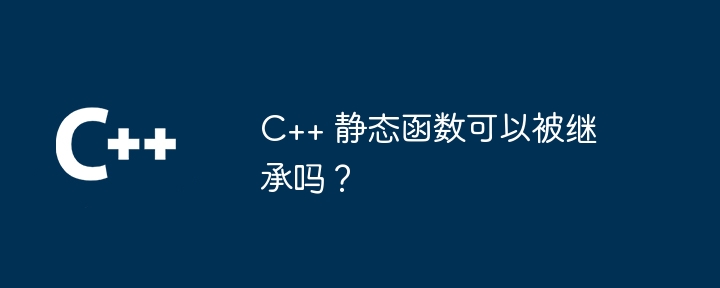
Can't. Static functions have nothing to do with the class, so they will not be inherited. Inheritance only applies to instance members, not static members.

#C Can static functions be inherited?
Preface
In C, static functions are usually used to implement some practical functions that have nothing to do with classes. One advantage of them is that they can be called without an object instance. However, a frequently asked question is whether static functions can be inherited.
Understanding static functions
Static functions are member functions modified by the static keyword. The difference between it and ordinary member functions is:
this pointer. Inherit static functions
Back to the original question, the answer is: No. Static functions cannot be inherited. This is because:
Practical Case
To further explain, let us consider the following example:
class Base {
public:
static void printMessage() {
std::cout << "Base class message" << std::endl;
}
};
class Derived : public Base {
};
int main() {
Base::printMessage(); // 输出: Base class message
Derived::printMessage(); // 错误: 'printMessage' 不是 'Derived' 成员
}In the above example, although the class Derived inherits other members of class Base, but it cannot inherit the static function printMessage. Attempting to call Derived::printMessage() will result in a compiler error.
Alternatives
Since static functions cannot be inherited, what should you do if you need to implement similar functions in a subclass? An alternative is to create a normal member function and use the final keyword to prevent it from being overridden. For example:
class Base {
public:
void printMessage() final {
std::cout << "Base class message" << std::endl;
}
};
class Derived : public Base {
public:
void printDerivedMessage() {
std::cout << "Derived class message" << std::endl;
}
};This approach allows subclasses to have their own member functions that perform similar tasks while preventing accidental overrides.
The above is the detailed content of Can C++ static functions be inherited?. For more information, please follow other related articles on the PHP Chinese website!
 What are the differences between c++ and c language
What are the differences between c++ and c language
 Recommended learning order for c++ and python
Recommended learning order for c++ and python
 Cost-effectiveness analysis of learning python and c++
Cost-effectiveness analysis of learning python and c++
 Is c language the same as c++?
Is c language the same as c++?
 Which is better to learn first, c language or c++?
Which is better to learn first, c language or c++?
 The difference and connection between c language and c++
The difference and connection between c language and c++
 C++ software Chinese change tutorial
C++ software Chinese change tutorial
 Cost-effectiveness analysis of learning python, java and c++
Cost-effectiveness analysis of learning python, java and c++




